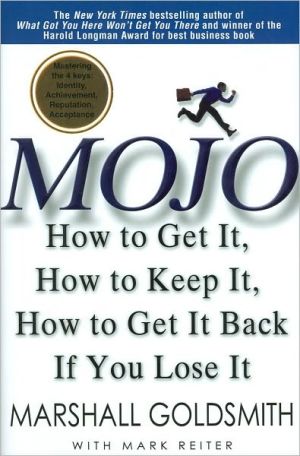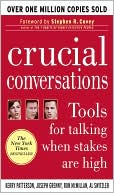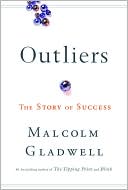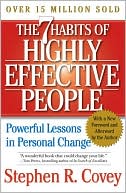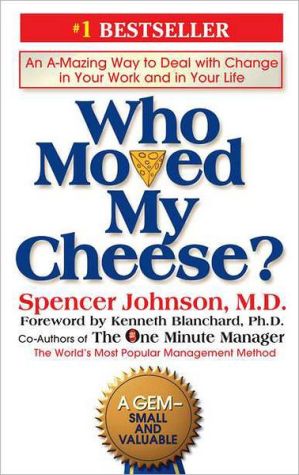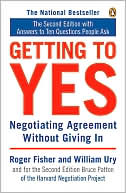Mojo: How to Get It, How to Keep It, How to Get It Back if You Lose It!
Mojo is the moment when we do something that's purposeful, powerful, and positive and the rest of the world recognizes it. This book is about that moment--and how we can create it in our lives, maintain it, and recapture it when we need it. \ In his follow-up to the New York Times bestseller What Got You Here Won't Get You There, #1 executive coach Marshall Goldsmith shares the ways in which to get--and keep--our Mojo. Our professional and personal Mojo is impacted by four key factors:...
Search in google:
Mojo is the moment when we do something that's purposeful, powerful, and positive and the rest of the world recognizes it. This book is about the moment-and how we can create it in our lives, maintain it, and recapture it when we need it. In his follow-up to the New York Times bestseller What Got You Here Won't Get You There, #1 executive coach Marshall Goldsmith lays out the ways that we can get-and keep-our Mojo. Our professional and personal Mojo is impacted by four key factors: identity (Who do you think you are?), achievement (What have you done lately?), reputation (Who do other people think you are-and what have you done lately?), and acceptance (What can you change-and when do you need to just "let it go"?). Mojo is: that positive spirit-toward what we are doing-now-that starts from the inside-and radiates to the outside. Mojo is at its peak when we are experiencing both happiness and meaning in what we are doing and communicating this experience to the world around us. The Mojo Toolkit provides fourteen practical tools to help you achieve both happiness and meaning-not only in business, but in life.
Mojo\ HOW TO GET IT, HOW TO KEEP IT, HOW TO GET IT BACK IF YOU LOSE IT \ \ By Marshall Goldsmith Mark Reiter \ HYPERION\ Copyright © 2009 Marshall Goldsmith, Inc.\ All right reserved.\ ISBN: 978-1-4013-2327-1 \ \ \ Chapter One\ Mojo, You, and Me \ A few years ago I attended a girls' high school basketball game with my friend Mel and his family. Mel's daughter Chrissy was her team's starting point guard. It was the league championship and we were all hoping for the best.\ But in the first half, Chrissy and her teammates could do nothing right. As they headed toward the locker room at halftime, they were down by seventeen points, their shoulders were stooped, and I could see a couple teammates arguing with each other. The coach was swinging his clipboard like a traffic cop, hurrying the girls as if he were afraid things might get worse if they didn't get off the court as quickly as possible. The game was so lopsided that I was dreading the second half. I could see Mel thinking the same thing: Please Lord, no mare of this.\ But we reminded ourselves that anything's possible, that Chrissy's team could claw back and at least make the game interesting. And that's precisely what happened.\ Chrissy and her teammates opened the half with a couple of three-point shots and a steal that led to an easy layup. In what seemed the blink of an eye, a daunting lead of seventeen points had been trimmed to a more manageable nine points. And Chrissy's team didn't let up. They continued to chip away until they trailed by only three. The opposing team's coach finally called a time-out and everyone on our side stood up to applaud our team's thrilling comeback.\ Mel turned to me and said, "We're gonna win this game." And at that moment, I knew exactly what he meant.\ The evidence was on the court. The entire tone of the game had changed. While in the first half Chrissy's team had been confused, now they were prowling the court with a renewed sense of urgency and a little more swagger. You could see it in their eyes. Each player was thinking, Give me the ball. I can do it. You could see the change come over the other team as well. While in the first half they were operating in a smooth, wordless flow as they built up their enormous lead, now they were tense, bickering with each other, whining about the referees, and turning more frequently to the bench, where their coach was gesturing wildly and trying to settle them down.\ Chrissy's team did, in fact, go on to win the game. Who can say why a confused, dispirited team emerged from halftime with a different attitude? Perhaps they found a communal purpose in the embarrassment of being down by seventeen points. Perhaps their coach gave them a new game plan. Or maybe they won the game simply because of the boost of confidence that came with the good fortune of starting the second half with a string of small successes that produced eight unanswered points. Maybe all of these factors combined to lift the team's spirit from negative to positive.\ What I remember most vividly about that game was that moment when Mel turned to me and we both knew that Chrissy's team would do just fine. We all felt it, and our natural response was to stand up and cheer.\ That moment is the condition I call Mojo. It is the moment when we do something that's purposeful, powerful, and positive, and the rest of the world recognizes it. This book is about that moment-how we can create it in our lives, how we maintain it, and how we recapture it when we need it again.\ To some degree, we're all familiar with Mojo. If you've ever given a speech-and done it well-you know the feeling. I realize that public speaking is one of people's greatest fears; many people would rather crawl through a snake-filled swamp than talk in front of a crowd. But if you're a remotely successful adult, chances are you've had to speak in public at some point. It might be a sales pitch to a customer. It might be an internal presentation where you defend your work to your bosses and peers. It might be a eulogy at a loved one's funeral, or a toast at your daughter's wedding. Whatever the occasion, if you've done it well-if the audience hangs on every word, nods in agreement, laughs at your jokes, and applauds at the end-you've created the same feeling that was spreading across Chrissy's high school gymnasium. You're firing on all cylinders and everyone in the room senses it. That is the essence of Mojo.\ The word "mojo" originally referred to a folk belief in the supernatural powers of a voodoo charm, often in the form of a piece of cloth or a small pouch. (q-hat's what Muddy Waters was referring to in his song "Got My Mojo Working.") That quasi-superstitious meaning persists for some people. I know one entrepreneur who doesn't go to work without playing five hands of gin rummy with his wife. "If I win," he told me, "I've got my Mojo. If she wins, I don't sign any contracts that day."\ Over time the word has evolved to describe a sense of positive spirit and direction, especially in the shifting tides of sports, business, and politics. It could be a politician in a tight election coming off a couple of weeks of successful error-free campaigning that results in a favorable jump in the polls; suddenly the pundits anoint him as the candidate in the race with Mojo. It could be a colleague who pulls off a string of moneymaking deals; suddenly everyone has to admit-some grudgingly-that she is "on a roll," that she's found her Mojo.\ To other people, Mojo is a more elusive sense of personal advancement through the world. You're moving forward, making progress, achieving goals, clearing hurdles, passing the competition-and doing so with increasing ease. What you are doing matters and you enjoy doing it. Sports people call this being "in the zone." Others describe it under the umbrella term "flow."\ My definition of Mojo spins off from the great value I attach to finding happiness and meaning in life.\ Mojo plays a vital role in our pursuit of happiness and meaning because it is about achieving two simple goals: loving what you do and showing it. These goals govern my operational definition:\ Mojo is that positive spirit toward what we are doing now that starts from the inside and radiates to the outside.\ Our Mojo is apparent when the positive feelings toward what we are doing come from inside us and are evident for others to see. In other words, there's no gap between the positive way we perceive ourselves-what we are doing-and how we are perceived by others.\ Four vital ingredients need to be combined in order for you to have great Mojo.\ The first is your identity. Who do you think you are? This question is more subtle than it sounds. It's amazing to me how often I ask people this question and their first response is, "Well, I think I'm perceived as someone who ..." I ask them to stop immediately, saying, "I didn't ask you to analyze how you think other people see you. I want to know who you think you are. Taking everyone else in the world out of the equation, including the opinions of your spouse, your family, and your closest friends, how do you perceive yourself?" What follows is often a long period of silence as they struggle to get their self-image into focus. After people think for a while, I can generally extract a straight answer. Without a firm handle on our identity, we may never be able to understand why we gain-or lose-our Mojo.\ The second element is achievement. What have you done lately? These are the accomplishments that have meaning and impact. If you're a salesperson, this might be landing a big account. If you're a creative type, it could be coming up with a breakthrough idea. But this too is a more subtle question than it sounds-because we often underrate or overrate our achievements based on how easy or hard they were to pull off.\ For example, one of the most senior human resources executives I know told me she could pinpoint the exact moment her career took off-although she thought nothing of it at the time. She was the assistant to her company's CEO. One day she heard him complaining about the company's tracking system for expenses. That night she wrote a memo to the CEO on how she would streamline the system. It didn't require much effort or brainpower on her part; as someone who had been filling out the CEO's travel and entertainment reports for years, she had a very good sense of the reimbursement system already in place. But the memo impressed her boss, who almost immediately moved her into the human resources department, where she could shake things up with her ideas. In her manager's eyes, she clearly demonstrated insight, initiative, and executive ability-and her memo became the moment that jump-started her career from assistant to where she is today, overseeing hundreds of employees.\ That's just one example of what might be defined as a "small" achievement, but was really a big one.\ We will look at achievements from two perspectives: (1) What we bring to the task, and (2) What the task gives to us. Until we can honestly put a value on what we've accomplished lately, we may not be able to create or regain our Mojo.\ The third element is reputation. Who do other people think you are? What do other people think you've done lately? Unlike the questions about identity and achievement, there's no subtlety here. While identity and achievement are definitions that you develop for yourself, your reputation is a scoreboard kept by others. It's your coworkers, customers, friends (and sometimes strangers who've never met you) grabbing the right to grade your performance-and report their opinions to the rest of the world. Although you can't take total control of your reputation, there's a lot you can do to maintain or improve it, which can in turn have an enormous impact on your Mojo.\ The fourth element to building Mojo is acceptance. What can you change, and what is beyond your control? On the surface, acceptance-that is, being realistic about what we can and cannot change in our lives and accommodating ourselves to those facts-should be the easiest thing to do. It's certainly easier than creating an identity from scratch or rebuilding a reputation. After all, how hard is it to resign yourself to the reality of a situation? You assess it, take a deep breath (perhaps releasing a tiny sigh of regret), and accept it. And yet acceptance is often one of our greatest challenges. Rather than accept that their manager has authority over their work, some employees constantly fight with their bosses (a strategy that rarely ends well). Rather than deal with the disappointment of getting passed over for a promotion, they'll whine that "it's not fair" to anyone who'll listen (a strategy that rarely enhances their image among their peers). Rather than take a business setback in stride, they'll hunt for scapegoats, laying blame on everyone but themselves (a strategy that rarely teaches them how to avoid future setbacks). When Mojo fades, the initial cause is often failure to accept what is-and get on with life.\ By understanding the impact and interaction of identity, achievement, reputation, and acceptance, we can begin to alter our own Mojo-both at work and at home.\ Mojo appears in our lives in various guises. Some people have it for almost everything they do, no matter how unpleasant the activity may seem to others. Some have it, lose it, and can't seem to get it back. Some lose it and recover it. And then there are those who have it in some parts of their lives but not in others.\ Which of the following examples sounds familiar to you?\ Case 1. Aside from my parents and family members, Dennis Mudd was the first "great person" in my life. Not "great" in the sense of a Winston Churchill or Buddha-who altered the lives of people they never met-but great nonetheless because, in his modest way, he had a lasting positive impact on the people he did meet.\ When I was fourteen years old and living in Kentucky, the roof on our home started to leak badly. So my father hired Dennis Mudd to put on a new roof. To save money, I was dragooned into assisting him. To this day, putting on a roof in the middle of a Kentucky summer is the hardest physical labor I've ever done. But it was eye-opening because I got to work every day with Mr. Mudd-a man with naturally abundant Mojo. I was amazed at the care Mr. Mudd put into the laying of the shingles. Nothing was left to chance. Everything had to be perfect. Mr. Mudd was patient with me as I made mistakes. If a tile was loose or out of line, he would help me rip it up and show me how to lay it down correctly. In hindsight, it's quite possible that my assistance actually slowed Mr. Mudd down, but he never mentioned it. After a while, I became "infected" by Mr. Mudd's joyful spirit toward the job of roofing in the hot summer sun. My attitude changed from "grudging willingness" to "pride in a job well done." Each morning, I woke up looking forward to working on the roof.\ When the project was finally over, Dennis Mudd presented my dad with an invoice and said, "Bill, take your time and inspect our work. If this roof meets your standards, pay me. If not, there is no charge." Mr. Mudd wasn't kidding, even though not getting paid would have been a serious financial hit for him and his family.\ Dad examined the roof, complimented us on a job well done, and paid Dennis Mudd-who then paid me.\ That pay-me-what-you-think-it's-worth gesture was not a stunt. It was an expression of Mr. Mudd's identity. I realize now, five decades later, that his pride in the quality of his work made this a low-risk proposition. He was confident other people would see the quality-and pay him what he deserved. Not only did he harbor an internal positive spirit toward what he was doing, but also it showed on the outside in a way that other people could not miss. That is Mojo in its purest form.\ Case 2. Chuck is a "former" TV executive who was once one of the top leaders in his industry. He was responsible for breakthrough ideas that you can still see evidence of on the air-and he still knows as much about his field as anyone in the business. He has been a "former" TV executive for five years-in other words, that's how long he's been out of work. And it's not that he hasn't been aggressively pursuing another job: With his contacts and credibility, he can pick up the phone and talk to any powerful decision-maker he wants. That's an enviable position to be in, and though he hasn't abused it, he's discussed his situation with virtually everyone in a position to help him.\ Over the years he's picked up the occasional consulting assignment, hoping that it might turn into a permanent job, but nothing has materialized. He's now fifty-five years old. The longer he's out of work, the less likely it is that he will get work. If you haven't worked in your field for half a decade, there comes a point when you can't call yourself a "TV executive" anymore.\ Through severance packages and sound investments, Chuck has saved enough money to provide for his family. But the situation is taking a toll on his psyche and confidence. Lately, he's begun worrying about what kind of role model he has been for his children. Do they see him as a success, or as someone who's been hanging around the house for five years? It also pains him to see leadership positions at TV networks, cable channels, and production companies now being occupied by some of the people he once hired and trained. He's begun talking more and more about the glory days when he was on top. He prefers reminiscing about the past to dealing with his future.\ Friends have told him that he should start up his own production company. When he was on top, he was one of the best "idea men" in the business. He could still use that talent to develop projects that he could pitch to his deep list of contacts. With that initiative, he'd be back in the game, dealing with potential customers as an equal rather than scratching at their doors for favors. But because of either inertia or fear, Chuck can't do it. He doesn't want to work for himself. He wants to work for a big organization. That's all he's ever done. That's all he knows. He wants to dial back his life to the way it was before he lost his job.\ (Continues...)\ \ \ \ \ Excerpted from Mojo by Marshall Goldsmith Mark Reiter Copyright © 2009 by Marshall Goldsmith, Inc.. Excerpted by permission.\ All rights reserved. No part of this excerpt may be reproduced or reprinted without permission in writing from the publisher.\ Excerpts are provided by Dial-A-Book Inc. solely for the personal use of visitors to this web site. \ \
Contents Acknowledgments....................ixChapter 1 Mojo, You, and Me....................3Chapter 2 Measuring Your Mojo....................17Chapter 3 The Mojo Paradox....................34Chapter 4 Identity: Who Do You Think You Are?....................43Chapter 5 Achievement: What Have You Done Lately?....................56Chapter 6 Reputation: Who Do People Think You Are?....................64Chapter 7 Acceptance: When Can You Let Go?....................79Chapter 8 Mojo Killers....................84Chapter 9 Four Pointless Arguments....................97Chapter 10 That Job Is Gone!....................102Chapter 11 Change You or Change It....................109Chapter 12 Identity: Making Sense of Who You Are....................116Chapter 13 Achievement: Making It Easier to Get Things Done....................136Chapter 14 Reputation: Taking Control of Your "Story"....................146Chapter 15 Acceptance: Change What You Can, Let Go of What You Can't....................163Chapter 16 Going Beyond Self-Help....................179Coda You Go First....................183Appendix I The Mojo Survey: Measuring Short-Term Satisfaction (Happiness) and Long-Term Benefit (Meaning)....................185Appendix II What the Mojo Survey Results Mean....................195Index....................201
